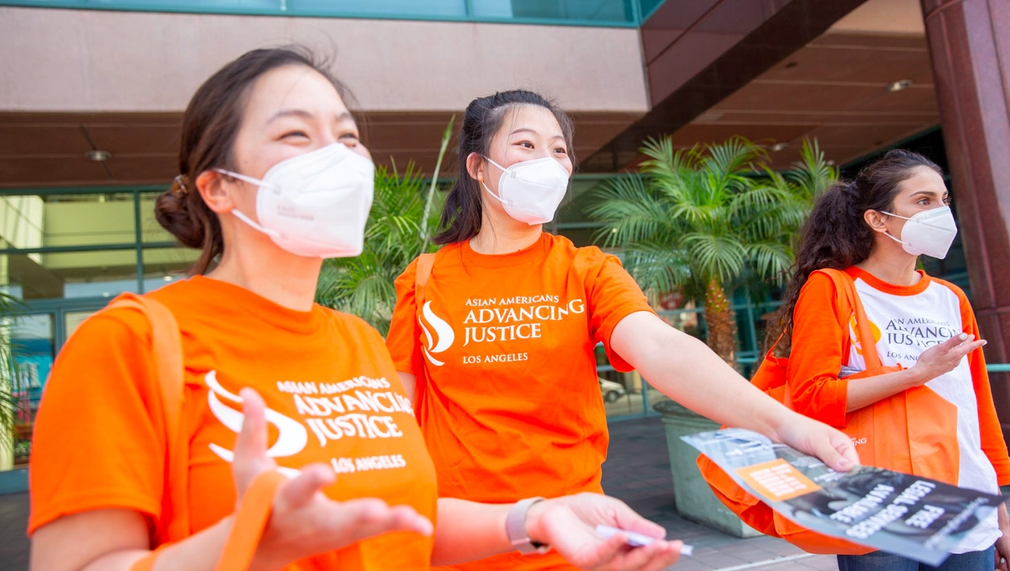Paths to Empowerment for Immigrant Survivors
Immigrants who are survivors of violent crimes, such as sexual abuse, domestic violence, and trafficking, face disproportionate underrepresentation and oppression, especially those who are low-income and/or limited English proficient. Our vision is to help pave the way to a safe future by helping them overcome barriers, including navigating the legal system, making immigration remedies accessible, and offering culturally and linguistically appropriate guidance and support.

What is the primary issue area that your application will impact?
Immigrant and Refugee Support
In which areas of Los Angeles will you be directly working?
County of Los Angeles
In what stage of innovation is this project, program, or initiative?
Expand existing project, program, or initiative
What is your understanding of the issue that you are seeking to address?
Immigrants are especially vulnerable to being victims of violence because of limited-English proficiency, hesitation to seek help due to fear of authority, and unfamiliarity with the legal system. This can make starting a new and safe beginning seem distant and unachievable for them. Isolated by language and culture, with limited job skills and little knowledge of their rights, immigrant survivors often fall into a cycle of violence. According to a 2020 report, an upper rate of 55% of Asian American and Pacific Islander (AAPI) women report experiencing violence during their lifetime, as well as barriers to seeking help with language, immigration status, and unavailability of services as the top reasons. Compared to other groups, this population was less likely to have an opportunity to obtain needed support, including help staying in the community safely (64% with access compared to 83% of other racial groups) and help with court cases against abuse perpetrators (38% vs. 80%).
Describe the project, program, or initiative this grant will support to address the issue.
With 40 years of experience, we provide survivors with critical, holistic, and culturally/ linguistically appropriate legal services that are essential to help them restart their lives violence – free. There is a significant shortage of AAPI language capacity legal aid in LA County, and although courthouses offer self-help services, service capacity is limited and inconsistent in AAPI languages despite having a substantial and growing AAPI population. To bridge this gap, Advancing Justice – LA is unique in providing the most AAPI languages (intake hotlines in Mandarin, Cantonese, Hindi, Korean, Tagalog, Thai, Vietnamese, and English; staff attorneys also have Spanish, Punjabi, and Armenian fluency to accommodate other populations in the region). The integration of immigration and family law services allows us to serve a niche set of immigrants who have been survivors of domestic violence, sexual abuse, and trafficking, to name a few. The complexity of these types of cases requires a comprehensive service delivery model that spans court assistance, legal representation, in-depth assessment and explanation to survivors about family law and immigration remedies, community outreach to allay survivors’ fears, and general education for public awareness. Our strong interdepartmental and interagency referral network ensures that our clients not only have access to legal services, but also to resources that will empower and support them in their journey to new beginnings.
Describe how Los Angeles County will be different if your work is successful.
Investing in the safety of immigrant survivors would be transformative not just on an individual level, allowing them to take back control of their own lives, but also at the community level, empowering all of LA County to collectively combat the ripple effect that violence incites. Our linguistically/culturally sensitive services extend a supporting hand to these clients in a way that recognizes the unique barriers they face, helping survivors build more rapport and trust with us and our resources – immigrants become more integrated into our communities when they experience intentionally mindful and inclusive support like this. Each case that we are successful in is one step closer to seeking justice for immigrant survivors; it opens the opportunity for them begin a new life and to begin thriving, rather than just surviving. It is then that they can begin to fully engage in society, and when that is possible, LA County becomes a safer and more hopeful place that they can call home.
What evidence do you have that this project, program, or initiative is or will be successful, and how will you define and measure success?
Our greatest marker of success comes from client stories as it paints a full picture of each survivor’s journey, rather than merely capturing statistics which can be helpful to understand the effect on a group but dilutes the impact on each community member, and their unique case. In one instance, a 67-year-old Korean woman sought escape from her abusive spouse. Our attorneys supported her by navigating legal processes for divorce, securing her immigration status, and applying for naturalization with a disability waiver for her dementia. In November 2021, she became a US citizen. In another, a client sent an inspiring message to our attorneys: “I wanted you to know that the work you do has made all the difference for me […] I can now raise my children with all the necessary tools, free of violence, and without the fear of deportation. Home Sweet Home at last.” Stories like these show the wide range of clients that need support and how we are collectively making our communities safer.
Approximately how many people will be impacted by this project, program, or initiative?
Direct Impact: 500
Indirect Impact: 1,000